The William Davidson Institute is a collaborative, multi-disciplinary organization. As a result, WDI often engages multiple sector and services teams in our work. The following project undertaken by both our Healthcare sector and Performance Measurement and Improvement service demonstrates our holistic approach.
The goal of the program is to support quality laboratory systems, which are needed in order to effectively scale-up HIV prevention, care and treatment efforts. WDI’s work includes developing the Monitoring and Evaluation design and implementation plan, and collecting data to measure the impact of the program activities that include Strengthening Laboratory Management Towards Accreditation (SLMTA) training and BD mentorship, in multiple labs across Kenya, Uganda, Rwanda and India.
Located in the rural Kumi district of Eastern Uganda, Kumi Hospital was originally founded as a leprosy center by the Church Missionary Society in 1929. In 1997, Kumi Hospital started offering outreach programs and outpatient care for a wide range of medical conditions. It has 350 beds and is a leading healthcare provider in the region. Kumi operates as a non-profit entity with the intent to provide affordable care to all those who require it.
To attract and retain qualified medical staff, the project team was engaged to work on an employee morale project. It focused on identifying areas of motivation and satisfaction for the nursing staff. The goal of this project was to establish alignment of organizational policies to nursing staff morale and construct a feasible long term strategy that Kumi Hospital could use to improve and maintain nursing staff motivation.
Located in the rural Kumi district of Eastern Uganda, Kumi Hospital was originally founded as a leprosy center by the Church Missionary Society in 1929. In 1997 Kumi Hospital started offering outreach programs and outpatient care for a wide range of medical conditions. It has 350 beds and is a leading healthcare provider in the region. Kumi operates as a non-profit entity with the intent to provide affordable care to all those who require it. The hospital recovers about 37% of its expenses through patient fees and depends upon international donors, the Ugandan government and other activities as other sources of revenue. A team was engaged in a cost-cutting project that required analyzing the hospital’s current supply chain and procurement of goods. The hospital’s supply chain system included external procurement and internal distribution of goods in the following areas: Drug Procurement, Drug Distribution, Food Procurement and Central Store, Transportation, Orthopedic Workshop and Approval Process.
Virika is a non-profit hospital located in Fort Portal, Uganda. It has a stated mission to serve the poor and vulnerable (mothers and children under five), and it enjoys a good reputation in Fort Portal and the surrounding area. The project provided an assessment of the processes within the inpatient department. The group’s process flow analysis helped Virika Hospital reach financial sustainability by: (1) Identifying opportunities for operational efficiency gains and cost cutting; (2) Identifying opportunities for service quality improvements; (3) Informing accurate costing and potential pricing changes of products and services; (4) Revealing and prioritizing opportunities for increased revenue generation
The University of Michigan’s Ross School of Business recently celebrated 25 years of Multidisciplinary Action Projects (MAPs), an action-based learning course for first-year MBA students who receive guidance from faculty advisers. During that span, 10,438 full-time MBA students have worked on 2,010 projects in 92 countries with 1,352 sponsor companies. In recent years, executive, evening and weekend MBA students have participated in MAPs as well.

WDI began sponsoring international MAP projects for Ross in 1992, the year after they began, and have funded and provided faculty advisers for about 225 projects in the 24 years since. WDI President Paul Clyde said MAPs are “one of many tools available to pursue our mission” to develop knowledge and capability that improves the effectiveness of firms and social welfare in emerging economies.
“We’re using it in specific initiatives as a way of building relationships and developing solutions in the field with our partners,” he said. “For us, MAPs aren’t an isolated event, they are part of a longer-term relationship.”
WDI Senior Research Fellow Ted London said MAPs not only benefit students and sponsoring organizations, but also faculty members who advise the projects. It is a valuable way to keep in touch with multiple organizations, understand their latest successes and roadblocks, and think more broadly about solutions.
“I enjoy MAP so much, in part, because it gives me the opportunity to listen and learn,” said London, who also is vice president of WDI’s Scaling Impact Initiative. “These are often organizations we have worked with for many years and it’s great to have another reason for a frank and in-depth engagement.”
Each MAP project requires analytical rigor, critical thinking, and teamwork from the students. Teams of 4-6 students spend seven weeks exclusively working on their MAP projects, including 3-4 weeks in the field. Sponsors receive top-notch deliverables and data-driven recommendations from the team.
After learning about their projects and conducting research in the classroom for several weeks, the students then spend three to four weeks working alongside their project sponsors in the field.
Clyde, who served as an adviser to his first MAP team in 1998 while on the faculty at Ross, said the student projects are a “fun way to teach.”
“Something always comes up that’s an illustration of a point made in their core courses,” he said. “I distinctly remember times when you could see the lightbulb go off and they suddenly understood the concept because they were in that setting, they were living it in the field.”
WDI’s Education Initiative recently began deploying MAP teams to help further its mission of identifying and sharing new ways to enhance management education in emerging markets. This past winter, two MAP teams worked on entrepreneurship projects in Kosovo and Morocco, and one team examined e-learning at a major technical university in Georgia.
“MAP teams allow us to offer our education partners in-depth strategic guidance and for us to be able to consolidate learnings across projects and thereby identify needs, trends, and best practices in management education,” said Amy Gillett, vice president of the Education Initiative. “The projects we’ve sourced related to entrepreneurship education are helping us develop new models and tools to share with a global audience through WDI’s new Entrepreneurship Development Center for emerging markets.”
London, who has been a faculty adviser to about 50 student teams since joining WDI in 2004, called MAPs a “virtuous cycle” that benefits students, WDI’s partners, and the institute’s research.
MAPs embed students with an organization, whether it’s a nonprofit or a corporation, and apply what they have learned in school to help solve an issue the organization is facing.
“They’re solving real problems and understanding the context,” London said “They’re on the ground 3-5 weeks so they have a chance to get acclimated and then really get engaged.”
Clyde said MAPs also are an opportunity for students “to learn how to work in a team setting, to test out their leadership skills, and learn about other cultures.”
Benefitting Organizations, Influencing Students
Allie Schachter was a member of a MAP team that worked with a company interested in rolling out an active learning platform in an emerging market context. Managed by WDI’s Education Initiative, Schachter and her team embedded with the Stockholm School of Economics in Riga, Latvia. Schachter said she enjoyed applying what she had learned in the classroom to a real-world business problem. (Watch a video of Schachter talking about the MAP project below).
“My MAP experience solidified and contextualized many of the concepts discussed in class, which was an incomparable educational experience,” she said. “It was a great opportunity to work with a group on a very large and involved project. Throughout the course of our project, we honed our ability to work together, delegated tasks to one another, and navigated difficult conversations and challenges together.
“It was a really great opportunity to gain experience working for and with others. I will certainly carry those experiences forward when working with teams at work and in future classes.”
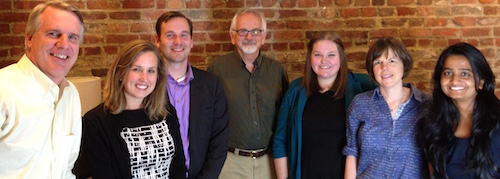
Perry Samson, center, poses with WDI President Paul Clyde, left, WDI Vice President of the Education Initiative Amy Gillett, second from right, and MAP team members.
Perry Samson, the Arthur Thurnau Professor in the Department of Atmospheric, Oceanic, and Space Sciences at the University of Michigan, developed the learning platform and enjoyed working with the MAP students to see how his product performed in an international setting. He called it “invigorating” and a “wonderful interaction” with the students, who were “thinking more deeply about all these things.”
“They thought of a number of things I didn’t think of,” he said. “They provided good insight on what drives adoption of technology in education and identified a number of suggested process changes.”

Diana Pauna
Diana Pauna, former pro-rector of the Stockholm School of Economics in Riga, found the project very useful for her university. She and her colleagues and students valued the opportunity to interact with a highly engaged team of MBA students from the University of Michigan.
“The project was extremely successful and a good learning experience for us,” she said.
London said because the MAPs are sourced with WDI partners, he and others are able to structure a good project that challenges students and benefits the organization.
“MAPs are of real value to the partners,” he said. “They do come back year after year. It’s a pressing issue they’re very keen to solve. Generally they have great outputs and create a substantial amount for the partners. That’s the reason we have a lot of repeats over the years.”
London and Clyde said MAPs can impact organizations for years to come, and can be life changing for students. London said MAP projects give students “an opportunity to see how the majority of the world lives and transacts, and it is something I believe they will carry with them the rest of their lives.”
He said one of the pleasures he gets from traveling with the students is watching them grow from the experience. Some students are committed to working internationally after graduation and have already traveled overseas. But others who will likely live and work in the U.S. when their MBA studies are complete still want to work internationally at least once.
“This isn’t what they are going to do with their life but it is something they want to experience,” London said. “We take them places and expose them to things they might not necessarily ever be exposed to. When we’re in Uganda, we’re not necessarily staying in the capital city. When we’re in Benin, we’re out in the bush.
“You can see the trepidation in some of them before they leave, and a sense of confidence when they get back,” he said. “And a whole new awareness of this world.”
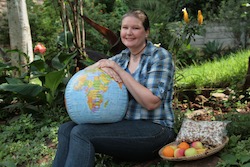
Former WDI MAP team member and WDI summer intern Patricia Griffin.
One student whose MAP experience changed her career path was Patricia Griffin, who was certain she would work for a U.S. automaker in a domestic car plant after getting her MBA. But she decided to join a WDI-sponsored MAP team headed by Clyde and that would work with a Uganda hospital.
Clyde remembers the team functioned without electricity for the first two weeks of its four-week stay. He said it was tough on the team but Griffin was energized by her experience and instead of heading to the auto plant now lives and works full time in Kenya.
“Questioning my assumptions and taking nothing for granted has become a basic mode of operation for how I conduct my career and life,” Griffin said of her time in Uganda. “That’s a direct result of the MAP experience.”
Ray Cummings, director of market dynamics for the global nonprofit health organization PATH, recently sat down for a one-on-one video interview with WDI’s Andrea Bare to discuss how it works to improve global health outcomes. The two also talked about Cummings’ career and how U-M students interested in the healthcare field can get involved in global health.
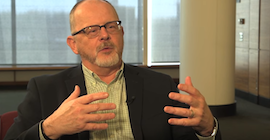
Cummings also spoke to U-M students for the WDI Global Impact Speaker Series on Feb. 17 about how PATH is addressing the challenge of improving coverage rates for many childhood vaccines in low-income countries.
“Ray has deep expertise in healthcare technology development and commercialization in both developed and emerging economies,” said Bare, senior advisor in the WDI Healthcare Initiative’s Market Dynamics group. “He works from the vantage point of several years in biopharmaceuticals business development and partnering, and has brought that expertise to PATH where he has led or contributed to projects for drugs, vaccines, and diagnostics in diseases such as malaria, HIV, and Japanese Encephalitis.”
Cummings’ market dynamics department provides analytical and strategic support for PATH programs that are working with both non-profit and commercial partners to develop new therapies, vaccines and diagnostics for underserved populations around the world. He also has served as commercialization director for PATH’s drug development global program, and senior business officer in its vaccine and pharmaceutical technologies group.
Cummings is the second Global Impact Speaker from PATH. In 2013, Amie Batson, chief strategy officer of PATH, spoke for the WDI speaker series. View a one-on-one interview with Batson here.
Also, PATH has partnered with WDI on several summer internship projects, including 2011 in Bangladesh, 2012 in India, 2013 in Vietnam and Cambodia, and 2015 in the U.S., South Africa, Ghana, and Uganda.
WDI and PATH are currently discussing the scope of a 2016 summer internship with the organization.
Prior to joining PATH in 2009, Cummings held senior business development positions at AVI BioPharma, Inc. (now Sarepta Therapeutics), GD Searle & Co., and Immunex Corp. (now part of Amgen Inc.).
Cummings has a bachelor’s degree in biological sciences from Stanford University, a master’s degree in biochemistry and molecular biology from Harvard University, and an MBA from the University of California, Berkeley.
Note: This is one in an ongoing series of articles profiling past WDI interns and Multidisciplinary Action Project (MAP) team members and their career paths. Additional profiles in the series may be found here.
With an engineering degree in hand, Patricia Griffin said she was probably destined for a job at an auto plant. But while studying for her MBA at Michigan’s Ross School of Business in 2009, she was part of a WDI-sponsored student team that traveled to a Ugandan hospital.
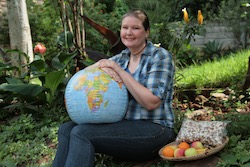
The experience changed her life – and the course of her career.
As part of the project, Griffin examined Kumi Hospital’s inventory management system and saw that it often ran out of life-saving drugs. She worked with the drug warehouse clerk on some basic supply chain management principles.
“In a matter of seven weeks, the hospital had stopped stocking out of essential medicines and patients stopped dying,” Griffin said. “At that point I realized my skill set was valuable and rare in this part of the world and I could either go back to the auto industry to eke out two seconds of additional productivity on an assembly line or return to Africa and save lives. The right choice was obvious to me.”
After earning her MBA, Griffin took a fellowship with LGT Venture Philanthropy working with Bridge International Academies in Kenya. She also oversaw operations at a nonprofit that partnered with local, smallholder farmers in Kenya to grow trees as a cash crop, and served as an adviser for more than a dozen health entrepreneurs in Kenya and Ethiopia for the global development firm Abt Associates. These work experiences helped Griffin discover where she could best contribute.
In 2014, she started her own company in Kenya – Inagape – that buys fruit from local farmers, dries it, packages it and then sells it as healthy snacks under the name Snak Afya. Its first product is a dried coconut snack food available at Nairobi stores. Plans are to add a flavored coconut snack food and possibly bottled coconut water.
Running her own startup business, Griffin often harkens back to her experience at Kumi Hospital.
As part of the Kumi project, Griffin and three of her fellow MBA students also worked with the staff at Kumi to cut costs so the facility wouldn’t run out of money at the end of each month.
The student team, part of Ross’ Multidisciplinary Action Projects (MAP) for MBA students, divided expenses into four categories – transport, food, medicine and medical supplies.
“We did a deep dive to see how the money was really being spent,” Griffin said. “At the end of seven weeks, we were able to make several recommendations on cost-saving initiatives and even implement some of the ideas.”
One example was that the hospital had two separate pharmacies serving outpatients and inpatients, but only one set of staff that had to walk about 50 yards between both. The hospital wanted to hire a second staff but the MAP team instead created one pharmacy with two service windows. The solution saved the hospital time and money by eliminating the need to hire more staff and making better use of the existing staff’s time.
When Griffin revisited the hospital in 2013, the two-window pharmacy was still in operation. “We’d spent our last weekend in Uganda executing that cost-saving recommendation, so seeing it still intact and functioning was affirming,” she said.
One of the lessons Griffin learned at Kumi was to ask questions and never assume anything. Like, for instance, why two pharmacies?
“I happened to ask why there were two pharmacy rooms in the first place and the answer I received was nothing I could’ve imagined,” Griffin said. “Apparently, during the Ugandan civil war, guerrilla groups would raid the hospital at gunpoint for medicines to treat wounded fighters in the field. When all the medicine was stocked in one room, the entire inventory would be stolen. Cleverly, by separating the pharmacy into two rooms, they’d only lose half their stock.”
That story stayed with her. She also reflects on the advice she received from the late C.K. Prahalad, one of her professors at the time, about working at the base of the pyramid. Prahalad encouraged her to sense an opportunity and then take the leap of faith “with both feet.”
“When the going gets tough and I feel like giving up or throwing in the towel, I think back to the number of sacrifices I’ve made to successfully switch careers,” she said. “I also re-read the encouraging note that Prahalad wrote to me on the bottom of my final essay for his class. It reminds me again why I wanted this career in the first place.”
And she thinks back to the lessons from that WDI MAP experience.
“Questioning my assumptions and taking nothing for granted has become a basic mode of operation for how I conduct my career and life,” Griffin said. “That’s a direct result of the MAP experience.”
Vaccines save 2.5 millions lives annually according to the World Health Organization, and during the past 15 years major strides have been made in coverage rates for many childhood vaccines in low-income countries.
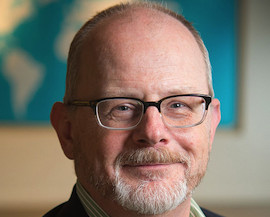
However, challenges remain as evidenced by the 1.5 million children under the age of 5 who still die each year from vaccine-preventable illnesses. Reducing this number will require progress on a range of economic issues related to vaccine procurement funding, reductions in vaccine costs, and economic sustainability of existing vaccine products.
Ray Cummings, director of market dynamics for PATH, will discuss how the Seattle-based international, nonprofit health organization is addressing these challenges as part of the WDI Global Impact Speaker Series.
Cummings’ Feb. 17 talk, “Economics of Global Vaccine Markets and Current Challenges,” will begin at 5 p.m. in Room R2220 at the Ross School of Business. It is free and open to the public.
“Ray has deep expertise in healthcare technology development and commercialization in both developed and emerging economies,” said Andrea Bare, senior advisor in the WDI Healthcare Initiative’s Market Dynamics group. “He works from the vantage point of several years in biopharmaceuticals business development and partnering, and has brought that expertise to PATH where he has led or contributed to projects for drugs, vaccines, and diagnostics in diseases such as malaria, HIV, and Japanese Encephalitis.”
Cummings’ market dynamics department provides analytical and strategic support for PATH programs that are working with both non-profit and commercial partners to develop new therapies, vaccines and diagnostics for underserved populations around the world. He also has served as commercialization director for PATH’s drug development global program, and senior business officer in its vaccine and pharmaceutical technologies group.
Cummings is the second Global Impact Speaker from PATH. In 2013, Amie Batson, chief strategy officer of PATH, spoke for the WDI speaker series. View a one-on-one interview with Batson here.
Also, PATH has partnered with WDI on several summer internship projects, including 2011 in Bangladesh, 2012 in India, 2013 in Vietnam and Cambodia, and 2015 in the U.S., South Africa, Ghana, and Uganda.
WDI and PATH are currently discussing the scope of a 2016 summer internship with the organization.
Prior to joining PATH in 2009, Cummings held senior business development positions at AVI BioPharma, Inc. (now Sarepta Therapeutics), GD Searle & Co., and Immunex Corp. (now part of Amgen Inc.).
Cummings has a bachelor’s degree in biological sciences from Stanford University, a master’s degree in biochemistry and molecular biology from Harvard University, and an MBA from the University of California, Berkeley.
Mango Fund seeks to encourage economic development in emerging economies by getting behind local enterpreneurs, especially those that are performing value add actvities within their countries. The impact investment fund provides both capital and advisory services to bolster sustainable growth of these emerging businesses. Student intern Bryce Jones worked on business valuation and the due diligence process. He also worked with portfolio companies to provide business advisory and consulting services.
Zagaya works to ensure malaria drugs are available and affordable for all, specifically artemisinin, its derivatives and Artemisinin Combination Therapies (ACTs). In Uganda, Zagaya is partnering with JLM Pharmaceuticals Ltd. JLM is a for-profit startup company dedicated to increasing access and availability of infectious/chronic disease diagnostics and pharmaceutical products in far, competitive, and innovative markets while emphasing the need to empower customers to make informed buying decisions. Student intern Amey Sutkowski worked to better understand the private sector supply chain in Uganda as it related to anti-malarials, and developed recommendations to make the supply chain more sustainble.